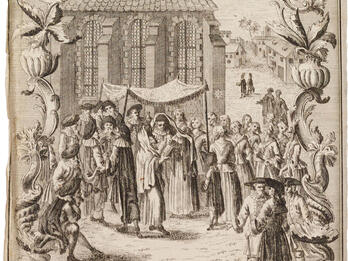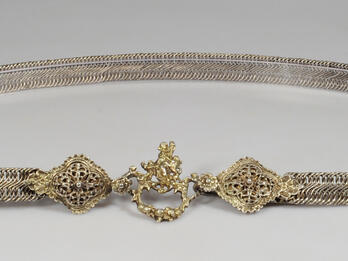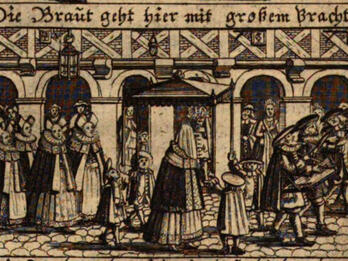Responsum: On Women’s Rights to Divorce
Question: Some of the poor members of the nation in Egypt [do as follows]. When a man fights with his wife and their marriage is not working out, and the wife wants to divorce but the husband does not, they are not able to force him to do it through the rabbinical court. The father and other relatives of the woman will go to the gentile courts and make a claim against the husband there. They bring false witnesses who report that he has declared before them that he divorces her, saying Tekhuni talqa batalta—that is, according to the laws of gentile courts, any man who says those words (which mean, “Behold you are divorced from me”) three times is thereafter forbidden to his wife until she marries another. After that, if she divorces the second husband, she can return to the first. This is the policy of the gentile courts.
The purpose of the woman’s father and relatives in carrying out such divorces through the gentile courts is to separate them [the couple]. They formalize a document in the gentile court with the signature of the responsible [judge] that she is divorced from her husband three times [i.e., he has declared it three times] and she is therefore forbidden to be with him. The husband is thus forced to separate from his wife. When this has gone on a month or two, some Jewish conciliators come to the husband and say “What good does it do you to leave a woman stranded? We will counsel her that you will give her a certain sum of money [presumably less than the marriage contract dictates] and free her with a writ of divorce according to the laws of Moses and Israel.”
An event like this occurred many years ago, in the year [5]366 [1605/6] in Egypt, and the rabbinic court arranged a writ of divorce for her according to the laws of Moses and Israel. After she was divorced by the rabbinical court, the husband came to protest that the writ of divorce he had provided was forced upon him by the document from the gentile court, which was issued based on a falsehood: that he had divorced her thrice with [the declaration] Tlaq al t’laata. Therefore, the writ of divorce is void. The rabbinic court that arranged the writ of divorce freed her without heeding the husband’s protests because his divorce from her was not forced on him by a Jewish court.
The Rika"sh [Rabbi Jacob Castro], however, in his manuscript responsum #132, disputes with that rabbinic court and says the law favors the husband, who is considered coerced, since it was testified in a gentile court that he had divorced her thrice, and he is forbidden to her by the laws of the gentile courts. This is the substance of that earlier controversy.
The later judges in Egypt, when it was clear to them that this method was being used . . . would trouble their courts to investigate the man’s original intentions. . . . And thus the tradition spread in the land of Egypt to heed the words of the Rika"sh [and not allow divorces through this subterfuge].
Now something terrible has occurred. Against the husband’s will it was written [in a gentile court] that he had divorced [his wife] with Tlaq al t’laata. He was forbidden to his wife and other demands were made of him. In his anguish the husband became an apostate. The apostate and his Jewish wife remained separated from each other. Then conciliators approached him and promised him money if he would divorce her by the laws of Israel, and he was persuaded. The rabbinic court told them that they should try to obtain an affidavit from [the court of?] ten saying she is permitted to him, in order that it not appear that he was coerced to give the divorce, and thus to uphold their tradition of adhering to the views of the Rika"sh [that the husband can not be forced]. This delayed matters.
Meanwhile, the divorced woman and her father heard that someone planned to reveal their secret—that the whole thing was deception and fabrication—to the gentile court; and the father and the entire household of the divorced woman were constrained to apostatize out of fear and danger. All these burdens of the period made [the rabbis] look for a way to modify the decision of the Rika"sh. [To conform to Rika"sh they had to obtain the extra affidavit that they were permitted to each other, a document which could endanger them if the gentile courts saw it]. For this reason the great rabbinic court of Egypt, may it be established in righteousness, wished to investigate whether the view of Rika"sh must be heeded when an event like this occurs.
Translated by
.
Notes
Words in brackets appear in the original translation.
Credits
Moses Ibn Ḥabib, “On the Manipulation of Women’s Right to Divorce,” from Jewish Questions: Responsa on Sephardic Life in the Early Modern Period, ed. and trans. Matt Goldish (Princeton and Oxford: Princeton University Press, 2008), pp. 151–152. Copyright © 2008 by Princeton University Press. Originally published in Hebrew as She’elot u-Teshuvot [Responsa], vol. 1, #193. Republished with permission of Princeton University Press.
Published in: The Posen Library of Jewish Culture and Civilization, vol. 5.






